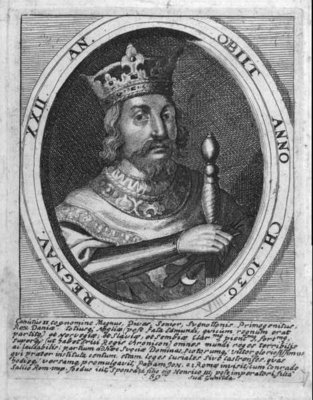Kilder
Kildeintroduktion:
Med erobringen af England i 1016 overtog Knud den Store et kongedømme med en lang kristen tradition og et veludviklet administrationssystem. Knud fortsatte denne tradition og gav love, gavmilde donationer til kirker og klostre samt styrede landet ved hjælp af sine jarler.
Dette brev til det engelske folk er formentlig skrevet hjem til England under Knuds rejse til Danmark i 1019-1020. Der lægges vægt på, at Knud har sikret England mod fremtidige vikingeangreb fra Danmark, hvor han nu også besad kongemagten.

Kobberstik af Knud den Store. Fra: Det Kgl. Bibliotek
1. King Cnut greets in friendship his archbishops, and his diocesan bishops, and Earl Thorkel and all his earls, and all his people, whether men of a twelve hundred wergild or a two hundred, ecc1esiastic and lay, in England.
2. And I inform you that I will be a gracious lord and a faithful observer of God's rights and just secular law.
3. I have borne in mind the letters and messages which Archbishop Lifing brought me from Rome from the pope, that I should everywhere exalt God's praise and suppress wrong and establish full security, by that power which it has pleased God to give me.
4. Since I did not spare my money as long as hostility was threatening you, I have now with God s help put an end to it with my money.
5. Then I was informed that greater danger was approaching us than we liked at all; and then I went myself with the men who accompanied me to Denmark, from where the greatest injury had come to you, and with God's help I have taken measures so that never henceforth shall hostility reach you from mere as Ion g as you support me rightly and my life lasts.
6. Now I thank Almighty God for his help and his mercy, that I have so settled the great dangers which were approaching us that we need fear no danger to us from there; but [we may reckon] on full help and deliverance, if we need it.
7. Now it is my will, that we all thank Almighty God humbly for the mercy which he has shown for our help.
8. Now I pray my archbishops and all my diocesan bishops, that they all may be zealous about God's dues, each in the district which is entrusted to him; and also I charge all my ealdormen that they help the bishops in furthering God's rights and my royal dignity and the benefit of all me people.
9. If anyone, ecclesiastic or laymen, Dane or Englishman, is so presumptuous as to defy God's law and my royal authority or the secular law, and he will not make amends and desist according to the direction of my bishops, I then pray, and also command, Earl Thorkel, if he can, to cause the evil-doer to do right.
10. And if he cannot, then it is my will that with the power of us both he shall destroy him in the land or drive him out of the land, whether he be of high or low rank.
11. And also I charge all my reeves, on pain of losing my friendship and all that they possess and their own lives, that everywhere they maintain my people justly, and give just judgments with the witness of the bishops of the dioceses, and practise such mercy therein as seems just to the bishop of the diocese and can be supported.
12. And if anyone gives asylum to a thief or interferes on his behalf, he is to be liable to the same penalty to me as the thief, unless he can clear himself of liability to me with the full process of exculpation.
13. And it is my will that all the nation, ecclesiastical and lay, shall steadfastly observe Edgar's laws, which all men have chosen and sworn to at Oxford.
14. For all the bishops say that the breaking of oaths and pledge is to be very deeply atoned for with God.
15. And also they teach us further that we must with all our strength and all our might earnestly seek, love and honour the eternal merciful God, and shun all evildoing, namely [the deeds of] homicides and murderers, and perjurers and wizards and sorceresses, and adulterers, and incestuous deeds.
16. And also we command in the name of God Almighty and of all his saints, that no man is to be so presumptuous as to take to wife a woman consecrated to a life of chastity or a nun.
17. And if anyone has done so, he is to be an outlaw before God and excommunicated from all Christendom, and to forfeit to the king all that he owns, unless he desists quickly and atones very deeply to God.
18. And more over we admonish that the Sunday festival is to be observed and honoured with all one's might from Saturday noon until dawn on Monday, and that no one is to be so presumptuous as either to practise any trade or to attend any meeting on that holy day.
19. And all men, poor and rich, are to go to their church and make supplication for their sins, and to observe zealously every appointed fast, and honour readily those saints whose feasts the priests shall enjoin on us,
20. so that all together through the mercy of the eternal God and the intercession of his saints we can and may come to the bliss of the heavenly kingdom and dwell with him who liveth and reigneth ever without end. Amen.